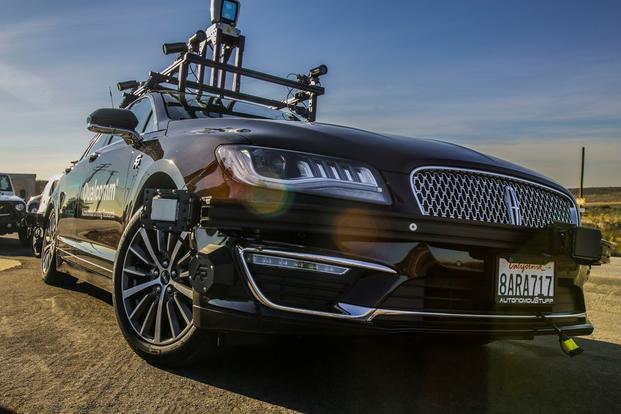While the rest of us wait for self-driving Uber cars to become a reality, troops at a small Marine Corps base outside San Diego may be among the first to kick the tires on cutting edge driverless vehicle technology.
Marine Corps Air Station Miramar, best known as a home base for a number of Marine Corps fighter jet squadrons, is now also serving as a testing ground for autonomous vehicles and other technology under a new service initiative, the Marine Corps Mobility Transformation effort.
As part of that effort, private companies including Qualcomm Technologies will be using a custom-made autonomous vehicle proving ground to test out their products. And Marines lucky enough to be stationed on the base can expect some rides out of the deal.
On Wednesday, industry representatives and local, state and federal government officials converged aboard Marine Corps Air Station Miramar, California for a demonstration of autonomous vehicle technology, according to a news release from the base.
Video of initial tests shows two passenger vehicles, a Kia Soul and a black Lincoln sedan, both operated by Qualcomm, traveling down a dusty Miramar road.
According to the release, two routes have been mapped at Miramar, one urban and one rural, to provide a course for autonomous vehicle testing. The first tests began earlier this month.
"We hope to be able to integrate these types of systems into our combat forces and into our garrison forces and that they will allow us to bring broader and more diverse technology to the Marine Corps and the military," Col. Jason G. Woodworth, commanding officer of the air station, said in a statement.
And, he added, it comes with a major perk for the Marines on-base: an autonomous vehicle shuttle that will begin operations in the next six months to a year.
According to the release, two driverless electric 15-passenger vans will be programmed to follow the urban track, making stops at Miramar's most popular locations. When not operating on schedule, officials said in the release, the vans will be available on-demand along the route.
Those vans are part of a second technology initiative, assessing electric autonomous vehicles that are vehicle-to-grid capable, meaning they can be charged through the air station's microgrid. That program, according to the release, will determine the feasibility of these vehicles as a means of transportation, both for official purposes and personal use.
"This gives the young Marines who are stationed here a chance to potentially ride in an autonomous vehicle before you can do it in many places," Woodworth said in a filmed interview.
For industry, Miramar provides a more controlled environment than a public road. Officials have to close roads at the air station or stop traffic for extended periods, allowing companies to create more precise conditions for data collection.
"Qualcomm is very pleased to be collaborating with Miramar on the research and development for technologies we believe are necessary for the automotive industry of the future," Paul Guckian, vice president of engineering for Qualcomm Technologies, said in a statement.
Testing is set to continue throughout this year.
-- Hope Hodge Seck can be reached at hope.seck@military.com. Follow her on Twitter at @HopeSeck.










